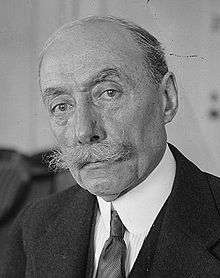Passionnément
| André Messager |
|---|
 |
|
Operas
|
Passionnément (Passionately) is an operetta or comédie musicale in three acts with music by André Messager and a French libretto by Maurice Hennequin and lyrics by Albert Willemetz.[1] The title comes from the refrain of a waltz-song in the second act. It premiered on 16 January 1926 at the Théâtre de la Michodière, in Paris.[2]
Performance history
In recent years performances have taken place in Marseille and Rennes (2003) and Aubagne (2009).
Roles
| Role | Voice type | Premiere Cast 29 September 1928 (Conductor: André Messager)[3] |
|---|---|---|
| William Stevenson | baritone | René Koval |
| Robert Perceval | tenor | Géo Bury |
| Captain Harris | baritone | Lucien Baroux |
| Le Barrois | baritone | Charles Lorrain |
| John | Julien Carette | |
| Ketty | mezzo-soprano | Jeanne Saint Bonnet |
| Julia | soprano | Denise Grey |
| Hélène | mezzo-soprano | Renée Duler |
Synopsis
Act 1
On board Stevenson’s yacht Arabella
Stevenson, a tough American businessman arrives at Trouville with his beautiful wife Ketty, her young Canadian maid Julia and the Captain Harris. He is there to buy land in Colorado – at a knock-down price - which a young Frenchman Robert Perceval has inherited, and who doesn’t realize that the oil may be found on the land. Distrustful of Frenchmen, Stevenson makes his wife Ketty (a former music-hall star) to show herself in public as an old woman, with white hair and tinted glasses; he forces her to swear this on the Bible. Robert comes on board, along with his friend Le Barrois and his wife Hélène, Robert’s jealous mistress, who is reassured by the sight of an old woman in glasses. Later, Ketty, without her disguise, meets Robert, and pretends to be the niece (Marguerite) of the brutish and teetotal Stevenson; they begin to fall in love.
Act 2
Trouville, in an elegant salon of the Villa des Roses
The yacht has had to be put into dry dock for repair. The visitors stay meanwhile in the Villa. Ketty confides in Julia her love for Robert. Stevenson is anxious to get the contract signed as soon as possible. Just as Robert is about to do so, he receives a note from ‘Marguerite’ warning him of underhand goings-on. So Robert stops signing, and Stevenson angrily goes off to the Casino. Robert wonders if Marguerite loves him and the act closes with them in each other's arms. Act 3
The next day
Julia hopes that just as her mistress has been blessed in love, so she will be. Stevenson returns home from the casino where he had discovered the delights of champagne. The three bottles have also made him become kind, considerate – and aware of the beauty of Julia… The two lovers take advantage of this change, and get Stevenson to reveal the riches of the Colorado terrain, and to divorce Ketty so that she and Robert can get married.
Recordings
Various excerpts were recorded in 1932 including some by members of the original cast.[4] The same year saw a film version produced by René Guissart.
Passionnément was recorded in July 1964 with the Orchestre Lyrique de l'O.R.T.F. conducted by J-P Kreder, with Lina Dachary, Christiane Arbell, Claudine Collart, Aimé Doniat, Dominique Tirmont, Gérard Friedmann, Hiéronimus and René Lénoty.
References
- ↑ Wagstaff J. André Messager. In: The New Grove Dictionary of Opera. Macmillan, London and New York, 1997.
- ↑ Casaglia, Gherardo (2005).[http://www.amadeusonline.net/almanacco?r=&alm_testo=Passionn%E9ment "Passionnément"]. Almanacco Amadeus (in Italian).
- ↑ L'encyclopédie multimedia de la comédie musicale théâtrale en France (1918-1940) Passionnément. Retrieved 7 October 2013 (in French).
- ↑ Morin P. Hommage à André Messager. Notes for Cascavelle CD Vel 3074, 2003.